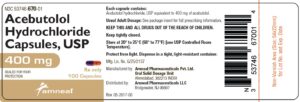BOLOGNA, ITALY—A University of Bologna study published in a scientific journal revealed data that may prove women taking the drugs to reduce high blood pressure are at more risk for heart failure than men. Beta-blockers are a class of medications that reduce high blood pressure. According to one study, there is a disparity in the effects between male and female patients taking beta-blockers.
An example of a beta-blocker is the drug, Acebutolol. It works by blocking the action of certain natural substances in the body, such as epinephrine (the principle blood-pressure raising hormone) on the heart and blood vessels. It lowers heart rate, blood pressure, and strain on the heart. The drug treats irregular heart beat (arrhythmia) and lowers the chances of heart attack and stroke. Other names include Atenolol, Betaxolol, Bisoprolol, and Carteolol.

Led by Raffaele Bugiardini, professor of cardiology at the University of Bologna (Bologna, Italy), researchers analyzed the effects of beta-blockers on men and women with hypertension who had no prior history of cardiovascular disease.
“Past research on the effects of beta blockers included a majority of participants who were men, so we sought to examine how sex/gender plays a role in the patient outcomes,” Bugiardini said. “Women are historically underrepresented in most clinical studies on hypertension. It’s important to include an equal split of male and female patients in future research, which could shed light on disparities and actionable treatments.”
The research included data from 13,764 adults in 12 European countries. Patients were classified by gender and separated into two groups: those taking beta blockers and those who were not.
They found that women taking beta-blockers for high blood pressure have a 4.6 percent higher risk for heart failure than men when they present to hospitals with acute coronary syndrome. This study was published in Hypertension, a peer-reviewed monthly scientific journal.
Women who had ST-segment elevation myocardial infarction (STEMI), in which a part of the heart muscle (myocardium) has died due to the obstruction of blood supply to the area, were 6.1 percent likely to have heart failure than men with STEMI.
Commenting on the increased risk of heart failure for women, Bugiardini said, “What we found presents a solid case for re-examination of the use of beta blocker therapy for women with hypertension. For women who have no history of cardiovascular disease and only hypertension, we think it is incredibly important for them to regulate their blood pressure through diet and exercise.”
With the study being observational, results may have some variance and additional data is needed for confirmation, researchers noted. Professor Bugiardini implied that further research needs to be done.
“It is possible that the increased risk of heart failure for women is due to an interaction between hormone replacement therapy and beta blockers, though this information was not collected or tested in our study. This and other potential factors need to be investigated in more depth,” said Bugiardini.






